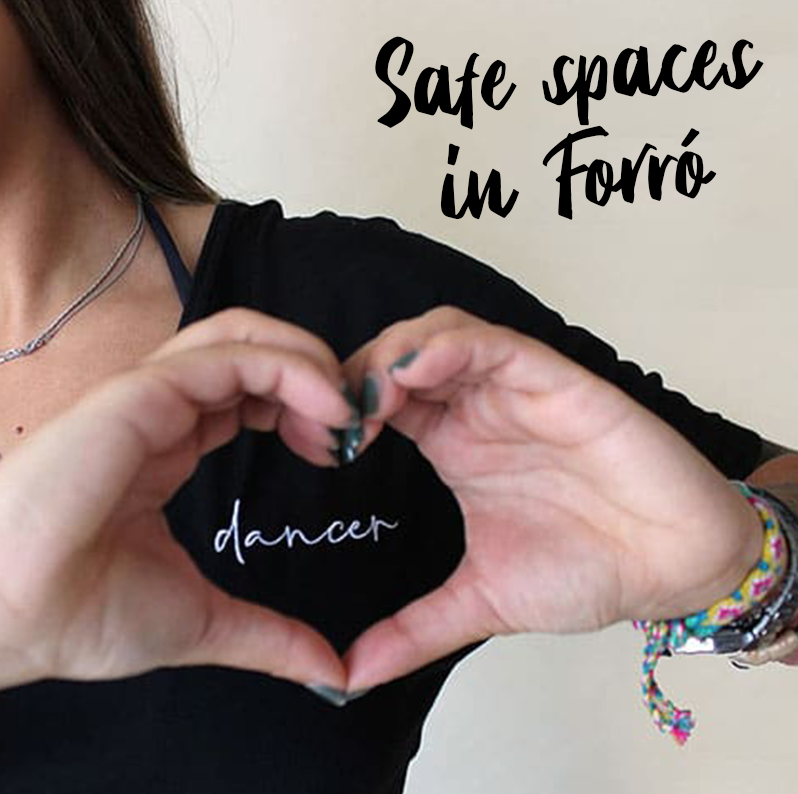No products in the cart.

Safe Spaces in Forró
Shout out to Karen for writing this! Together with the feedback of all the ladies from Women in Forró Group
We care about you and we are here to support you!
In Forró we get very close to each other physically and we realize that sometimes it can be very confusing to all of us to find out where “the line” is of what is ok and what is not ok. The personal boundaries can be very different from individual to individual of how close a person generally likes to be with others or not. Plus, it varies largely depending on who you are dancing with. Sometimes a dance can become very sensual with the right person, sometimes not at all. We want EVERYBODY to enjoy the dance while at the same time make it very clear that personal boundaries need to be respected and not overstepped in order to make our dance community a safe place. Please note that even though this text is written by women it intends to address all genders, as well as leaders and followers equally!
So, how do I know where my boundaries are?
You can feel it. If your boundaries are being overstepped your body will tell you. It can be a dance move you don’t like to do (with this person), maybe you don’t want to dance close with them or not touch heads with them. Maybe they smell bad or they are too drunk. At times, you know exactly what bothers you and you identify the problem on the spot. Since leader and follower each share 50% of the dance, claim your share and your space in it. Tell your dance partner about what makes you uncomfortable and ask them to change it. Your partner might not be aware at all that you are uncomfortable and he or she might be grateful to get some feedback. You can move their hand in a different position, ask them to keep their head in their axis or that you simply do not want to do that move. The more we talk to each other about this the better will be the dance. Don’t expect your partner to be telepathic. However, this is about giving feedback about something that makes you uncomfortable and needs to be said. If you want to give feedback about something else that is not urgent or concerns other topics of the dance, please ask if it is ok to give feedback first.
But what if your line has been overstepped just slightly? Maybe what happened was so subtle that you can’t really say what exactly it was that made you feel uncomfortable. You just know there is something you don’t like, you have a creepy feeling or you might get a bit tense. Maybe your dance partner repeatedly brushed body parts where you don’t want to be touched, looks at you in a way or said something that make you uncomfortable. You might not be sure if it was intentional or not. In any way, please do not ignore these feelings! They are part of your alarm system to protect you. Your guts ALWAYS know what you like and what not and when something is wrong! Sometimes you realize only later what caused it. If you feel uncomfortable, you can always stop the dance! There is no obligation to dance with anybody at anytime.
How do I know where other people’s boundaries are?
If you are not sure about something: Ask them. They will gladly tell you. The more your talk the better! “Is it ok if I do this or that?/ Are you alright with me doing this or that?” If your dance partner gives you feedback about something that makes them uncomfortable or even hurt them, listen to them. Please respect their wish and ask them how you can improve. Reading body language can help and give you hints if the person feels comfortable or not, but be careful, it can also be misleading and has lots of room for misinterpretation. For example a naturally cuddly and touchy person that smiles a lot might be mistaken for flirting. Lots of people are at the party just for the dance and the joy of it, not necessarily to find a date. If you want to be safe to flirt with someone but wonder if they like you, check out if they are interested in you through talking to them after or in between dancing. Do not just assume they flirt with you because they dance so smooth or close to you. And NEVER EVER start touching anybody (besides the common connecting points of the dance) without their active consent! – “But he/she did not say no… Nor did he/she stop my advances…” That is NOT consent! The person might be taken by surprise and unsure of how to react, be afraid to be judged as “overreacting” and therefore not saying “no”.
Clearly crossing the line
Sadly, in our dance communities people have reported that their boundaries have intentionally been overstepped. “No” has not been taken for an answer. Physical advantage, status in the community, or dance experience have been abused to gain personal benefit and to disrespect and harm others. Here are a few examples that have been reported by people in the Forró dance scene that have happened without their consent and clearly overstepped their boundaries:
- Grinding the other person’s leg,
- Not taking distance when having a boner but rubbing the erect penis against the other person’s leg,
- pulling the woman’s hand down to the erection and make her touch it,
- kissing or smelling the neck of the dance partner, biting or licking their ear,
- kissing somebody against their will,
- Intentionally touching and fondling women’s breasts during the dance or other off-limit body parts,
- pulling the person very close and not letting go,
- Making unwelcome sexual comments or jokes,
- humiliating and ridiculing a person when they refused to be intimate or have sex,
- staring at somebody through the room and repeatedly following them with the eyes,
- Physically hurting the other person by dancing too rough and grabbing hard on their back/ arm/ hand,
- Following or insisting to accompany somebody on their way home against their will,
- not taking “no” for an answer to stop any of the above.
Now, we know this does not happen all the time so please do not get scared or feel generally unsafe in the dance. On the contrary, our aim is to create a safer space! We know this information can be shocking. But these incidences unfortunately happened and each time is one too many. Some things do not even get reported. Ignoring this is not an option. Instead we want to raise awareness and the best way is to educate, make it public and transparent so there is less and less room for bad stuff to happen. We want to do something about it and not just watch!
This is happening to me/ has happened to me/ I am not sure – What can I do?
Please trust your feeling even if you feel uncertain about it. Realize that what happened or is happening is not ok. You are absolutely in the right to say no, to defend yourself verbally and physically if necessary, stop the dance and get out of the situation. The person who is doing this to you is in the wrong. And it is 100% THEIR fault and not you who caused it. And no, you are not overreacting nor rude. Seek help from a person you trust or know or go to the organization of the party/event that you are in. Do not worry about what might happen to the person who harmed you if you ask others for support. You need to protect yourself and it is not at all your responsibility to protect other people from the consequences of their own actions, especially not if they harm you. We are here to hear you, believe you and support you in the best way possible for you! If you feel unsafe to go home on your own after an event, you can ask us for help to organize a ride or a taxi or find other people who go the same way.
What can I do if I witness something happening or if somebody reports something to me in a party?
This can be very challenging and overwhelming and maybe you are not sure at all of what you can do.
- It is very important to take the person reporting to you seriously. It is very likely not a joke, nor a made up story! False accusations are statistically very seldom. So please, listen to what they are telling you and realize that this person is in need of help.
- It is ok not to know how to handle a situation like that or not to have the right answers! You don’t have to provide your personal opinion on it, just be there and ask the person how you can support them.
- If the accused person is a friend of yours or somebody you know, maybe even a well-known and respected teacher in the scene, it can be a shock to you and “hard to believe”. You might even feel doubt in favor of your friend or the person of whom you have a different picture. However, please realize that this person has very likely and seriously harmed somebody, maybe has already done so in the past and probably will continue to do so in the future! You will become a part of it by accepting or making excuses for that person’s behavior. The only people that get upset when somebody sets boundaries are those who benefited from that person not having them.
- If you witness somebody harassing another person or you have a feeling that something is wrong, you can step in if you feel the courage to do so and offer your help to clear the situation. To not go on your own you can ask another person to come with you. Remember, you can always ask the organization of the event for help. However, if the situation is dangerous always put your own safety first! Call the security of the event or the police (dial -112 for emergencies in Europe).
Harmful behavior towards other people only grows in an atmosphere of secrecy where victims are silenced and bystanders are turning their heads! This given, the victims often stay silent and rather choose to avoid that person. They drop out of the class/group/community or even stop dancing entirely, especially if they are beginners. Meanwhile the problematic person stays in the group and continues to harm others. It goes as far as it becomes a “known secret” that this person is a problem but still nobody speaks up. When asked, some people report that they were afraid to not be supported nor believed, or even to be victim blamed, shamed, ridiculed, or outcasted if the offender had either status or a lot of friends in the community. Bystanders might not see it as a big enough problem (for them) and find it easier to avoid or ignore the victim or the topic. To not let that happen we encourage everybody to become aware of how dangerous an atmosphere like this can be and be able to identify a behavioral structure if it is happening!
Therefore we listen, we care, and we talk. We do not tolerate people who harm others – no matter their position in the dance scene or how small the incident. Our aim is to create a safe and transparent place that uncovers any kind of verbal, physical, emotional or sexual violence or abuse!
Thank you for your support!
Much love!
An initiative of the “Women in Forró”- Group
(Let us know if you as a Forró group/teacher/community/organizer want to cosign this letter.)
You have feedback or questions to this text? Something is missing or unclear?
→ please contact us here: https://www.facebook.com/groups/1016967138692178/ or https://xiadodaxinela.com/contact/
Want to become active in your community?
- Raise awareness and start discussions in your group, exchange experiences
- Make it a topic in class – especially in beginner classes! They need it the most since they don’t know the dance yet. Encourage followers and leaders to tell each other what is ok and what not.
- Encourage others to speak up and maybe practice with a friend in a simulated situation how to express that you don’t like something in the dance,
- Create a care team for parties,
- Confront people who offend others and set clear rules. If the offender keeps harming others ban them from the group/class/events.
- Boykott teachers/djs/musicians that are known for overstepping boundaries regularly and have harassed, offended, abused or assaulted members of your group.
Want to join our facebook group?
visit “Women in Forró” (sorry, ladies only): https://www.facebook.com/groups/1016967138692178/
Related Articles
Get the XX screensavers!
Porque recebo tantos NÃOs e como lidar com isso?
Why do I get so many NOs & how to deal with it
Comments (1)
Xiado Friends
Categories
- Dance philosophy (11)
- Downloadables (2)
- Em português (6)
- In english (8)
- Xiado News (1)
About
We want everyone to fall in love with their dance clothes and shoes! We produce our own clothes, made in Portugal with love, but we also try to find the best products from other brands for you forrozeir@s out there!
Xiado da Xinela
Check out our Privacy Notice
Check out our Blog!
-
 Get the XX screensavers!
May 1, 2020
Get the XX screensavers!
May 1, 2020
-
 Apaixona-te pelos screensavers do Xiado!
May 1, 2020
Apaixona-te pelos screensavers do Xiado!
May 1, 2020

It’s the first time, i see such a site with the whole negative list of possible experiences in Forro espacially for weman. It is good for weman to know it, so they are a little bit prepared to act better If something of that would happen to them. On the other site i miss some advice, how to act, when you not feel good in not extreme but more usual situations. I think you can protect yourself from bad experiences, when you stop dancing as soon as you do not feel good. It never makes any sence to continue dancing you do not like. And to speak about the way you like to dance may help too.